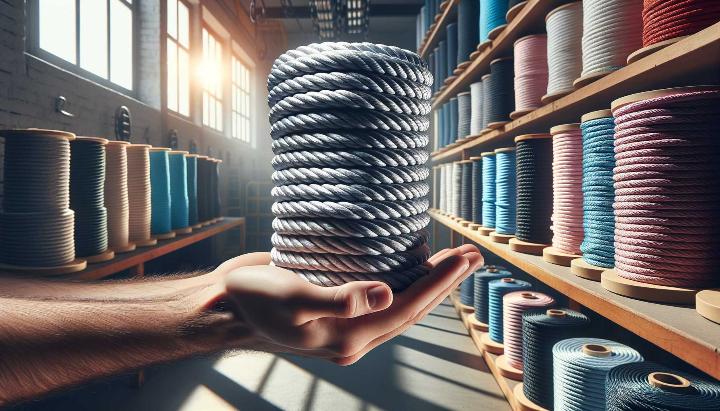Have you ever found yourself in a sticky situation, desperately needing the right rope to save the day? Whether you're an off-road enthusiast, a seasoned sailor, or a professional in the construction industry, choosing between poly nylon rope and poly winch rope can make all the difference. At iRopes, we've seen firsthand how the right choice can turn a potential disaster into a smooth operation.
In this comprehensive guide, we'll unravel the mysteries of poly nylon rope and poly winch rope, two powerhouses in the world of synthetic fibres. We'll explore their unique properties, strengths, and ideal applications, helping you make an informed decision for your specific needs. As a leading manufacturer of fibre woven ropes, including winch ropes, nylon trailer ropes, and speciality lines for various industries, we're here to share our expertise and ensure you're equipped with the knowledge to choose the perfect rope for any task.
From the flexibility of poly nylon to the raw power of poly winch rope, we'll dive deep into the characteristics that set these ropes apart. By the end of this guide, you'll understand why selecting the right rope is crucial for safety, efficiency, and success in your projects. So, are you ready to learn how a simple choice of rope can revolutionise your operations? Let's get started!
Understanding Poly Nylon and Poly Winch Rope Differences
When it comes to choosing the right rope for your specific needs, understanding the differences between poly nylon rope and poly winch rope is crucial. As a seasoned rope manufacturer, I've seen firsthand how these two types of ropes perform in various situations. Let's dive into the key distinctions that will help you make an informed decision.
Physical Properties of Poly Nylon vs Poly Winch Rope
Imagine running your hands along two different ropes - one smooth and slightly stretchy, the other more rigid and unyielding. That's the tactile difference you'd feel between poly nylon and poly winch ropes. Poly nylon rope is known for its flexibility and elasticity, while poly winch rope offers a stiffer, more robust feel.

The composition of these ropes plays a significant role in their characteristics:
- Poly nylon rope is made from synthetic nylon fibres, giving it excellent stretch and recovery properties.
- Poly winch rope is typically constructed from high-strength polyethylene or polyester fibres, resulting in minimal stretch and high tensile strength.
Performance Characteristics in Various Applications
Now, let's consider how these ropes perform in real-world scenarios. I once worked on a marine project where the choice between poly nylon and poly winch rope made a significant difference in the operation's success.
- Strength and durability: Poly winch rope outperforms poly nylon in terms of overall strength and resistance to abrasion. It's the go-to choice for heavy-duty applications like winching and towing.
- Water absorption: Poly nylon rope absorbs water, which can affect its performance and increase weight when wet. In contrast, poly winch rope remains relatively unaffected by moisture.
- Elasticity: The stretchy nature of poly nylon rope makes it excellent for absorbing shock loads, ideal for mooring lines or anchor rodes. Poly winch rope's low stretch is perfect for precise control in winching operations.
When choosing between these ropes, consider your specific application. Are you looking for a rope that can absorb shock and provide a bit of give, or do you need something with minimal stretch for accurate load control?
Pro Tip: For marine applications, poly nylon rope is often preferred for its ability to absorb shock and resist chafe, while poly winch rope excels in precision winching tasks.
Remember, the right choice depends on your specific needs. Whether you're rigging a sailboat, setting up a winch system, or looking for a reliable general-purpose rope, understanding these differences will guide you to the perfect solution. Have you considered what type of application you'll be using your rope for? Feel free to reach out if you need more personalised advice!
Advantages of Using Poly Nylon Rope in Specific Applications
As a rope enthusiast with years of experience in the industry, I've come to appreciate the unique properties of poly nylon rope. Its versatility and strength make it a go-to choice for a wide range of applications. Let's dive into why this remarkable material stands out in the world of ropes.
Strength and Durability of Poly Nylon Rope
When it comes to strength, poly nylon rope punches well above its weight. I remember a time when I was rigging a sailboat for a regatta, and the difference in performance between poly nylon and other materials was night and day.
- Impressive tensile strength: Poly nylon rope offers exceptional load-bearing capacity, often surpassing steel wire of the same diameter.
- Shock absorption champion: The natural elasticity of nylon allows it to absorb sudden impacts, reducing the risk of snapback in marine and climbing applications.
- Resilience under pressure: Its ability to withstand repeated stress makes it ideal for applications with frequent load cycles.

Versatility in Various Industries and Applications
The adaptability of poly nylon rope never ceases to amaze me. From the depths of the ocean to the heights of mountain peaks, this material finds its place in numerous industries:
- Marine marvels: Ideal for mooring lines, anchor rodes, and general boating uses due to its strength and ability to float. Learn more about high-strength double braided marine rope solutions.
- Construction powerhouse: Used in scaffolding, hoisting, and safety lines where reliability is paramount.
- Outdoor adventure companion: Essential for climbing, camping, and hiking gear, offering peace of mind in challenging environments.
- Industrial workhorse: Employed in material handling, towing, and as utility cords in various industrial settings.
Have you ever considered how many different ways you might use a poly nylon rope in your daily life or work? The possibilities are truly endless!
Pro Tip: When selecting poly nylon rope for your application, consider factors like UV exposure and chemical resistance. While nylon excels in many areas, it's always best to match the rope's properties to your specific needs.
As we continue to innovate in rope technology, poly nylon remains a staple due to its remarkable balance of strength, flexibility, and affordability. Whether you're securing a load, setting up camp, or preparing for a nautical adventure, poly nylon rope is likely to be your reliable partner. And remember, for more detailed information, our comprehensive rope PDF guides are always at your fingertips, offering in-depth insights into the world of ropes.
Benefits of Choosing Poly Winch Rope for Demanding Tasks
When it comes to tackling tough jobs, poly winch rope has become a game-changer in the world of rigging and recovery. As someone who's spent years in the field, I've seen firsthand how this synthetic marvel outperforms traditional steel cables in the most challenging conditions. Let's dive into why poly winch rope is quickly becoming the go-to choice for demanding tasks.
Superior Strength-to-Weight Ratio
One of the most striking advantages of poly winch rope is its impressive strength-to-weight ratio. Picture this: you're out on a remote trail, your 4x4 bogged down in thick mud. The last thing you want is to lug around a heavy steel cable. That's where poly winch rope shines.
- Lightweight champion: Poly winch rope is up to 80% lighter than steel wire rope of equivalent strength, making it easier to handle and transport. Discover the benefits of yellow braided winch rope for superior strength and flexibility.
- Powerhouse performance: Despite its light weight, poly winch rope boasts a breaking strength 30-90% higher than steel cable of the same diameter.
- Effortless operation: The reduced weight translates to less wear and tear on your winch motor, extending its lifespan and improving overall performance.

Enhanced Safety Features
Safety should always be your top priority when working with any type of rigging equipment. Poly winch rope takes this to heart, offering significant safety improvements over traditional steel cables.
- Reduced risk of injury: Unlike steel cables that can develop sharp burrs or frayed edges, poly winch rope remains smooth and splinter-free, reducing the risk of cuts and injuries during handling.
- Minimal stored energy: In the event of a line break, poly winch rope doesn't store energy like steel cable, significantly reducing the dangerous whiplash effect.